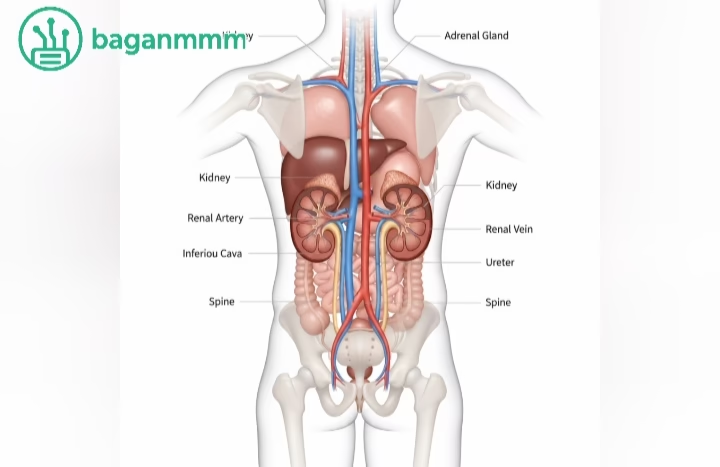Hello everyone. This time the topic I want to share is an educational case about a grandmother whose whole kidney almost failed due to lack of health knowledge. After reading this, I want you to share it again with your elders around you as well as for yourself.

This story shows that lack of health knowledge is extremely dangerous. So let me tell you this case. This is an incident that a doctor friend personally experienced and shared.
Disclaimer:
This content is for educational purposes only and does not provide medical advice. Please consult a qualified healthcare professional for personal guidance.
The kidney is one of the important parts of our body. It removes toxins and unnecessary substances from the blood and regulates the body to stay healthy and strong. Therefore, if a person’s kidney is not good, they will lose health and strength and also easily get infected with other diseases. It is your responsibility to keep your kidney in the best condition.
Functions of the Kidney
1. Filtration
The kidney filters toxins (urea, creatinine) from the blood and excretes them as urine. In one hour, it can filter all the blood in the body once.
2. Fluid & Electrolyte Balance
The kidney regulates important electrolytes such as sodium, potassium, and calcium accurately. It adjusts according to the body’s needs.
3. Acid–Base Balance
The kidney maintains the pH in the blood and prevents excessive acidity. If the kidney does not work properly, acids increase in the body and cause health problems.
4. Blood Pressure Regulation
The kidney produces the hormone renin and regulates blood pressure. Temporary high or low blood pressure problems are also related to kidney health.
5. Bone Health
The kidney activates vitamin D and helps calcium absorption. Therefore, it is necessary for healthy bones and muscles.
6. Red Blood Cell Production
The kidney produces the hormone erythropoietin and stimulates new red blood cell production. Only by doing this can the body replace the cells that die every day.
So this is what I can explain about the kidney’s functions. In summary, the kidney is an important organ that filters waste and toxins from the blood. If the kidney is not good and cannot filter waste and toxins, the following problems occur:
- 1. If toxins cannot be removed, blood toxins will increase. Substances like uric acid will accumulate in the blood and cause pain, gout, and other diseases.
- 2. If water and salt are imbalanced, blood pressure, heart, and nerves can be damaged. Therefore, if your kidney fails, dialysis or kidney transplant is needed.
The kidneys work like filters that clean the blood and maintain all balances in the body. Therefore, kidneys are essential for your body and necessary to stay healthy.
According to a medical record, a 74‑year‑old grandmother had shortness of breath for six weeks and swelling of the legs. When examined, protein was very high in the urine, albumin was very low in the blood, and kidney function was declining.
These are typical symptoms of nephrotic syndrome. At first, she was diagnosed with urinary tract infection and given antibiotics and diuretics, but kidney function continued to decline, and after three days she was transferred to a higher‑level hospital. Doctors monitored her condition and further tests showed interstitial nephritis, but the kidney structure was normal.
This was a very unusual condition. The combination of nephrotic syndrome and interstitial nephritis is most often caused by non‑steroidal anti‑inflammatory drugs (NSAIDs). But the problem was that the patient said she had never taken any painkillers. Her family confirmed this, and her family doctor also said he had never prescribed them.
As a precaution, doctors stopped all her medicines, but kidney function continued to decline until she needed dialysis. At that time, an important clue appeared. One day, nurses found a bottle of “pain relief gel (piroxicam gel)” in her wardrobe. The grandmother had been secretly applying it on her shoulders and back in the hospital bathroom to relieve muscle pain.
She had used up to three large 60‑gram bottles within six weeks, applying more than twice a day. Although it was an external gel, piroxicam and other NSAID gels can be absorbed through the skin into the blood and damage the kidneys. When she stopped using the gel, something amazing happened. Her kidney function quickly improved, she no longer needed dialysis, swelling decreased within three weeks, protein in the urine reduced significantly, and kidney function returned to normal.
Warning from medical experts:
Many people think, “I don’t take it, I only apply it, so nothing will happen.” Especially elderly people. They often carry some kind of pain relief ointment for joint or muscle pain.
But in reality, external medicines can also be absorbed into the blood and pose kidney risks. Especially if used long‑term, on large areas, and frequently, the total drug amount can be more than you think. Analgesic patches also contain NSAIDs, which can be absorbed into the blood and damage the kidneys.
Especially elderly people and those with poor kidney function should be very careful with these medicines. This is important because before you realize it, your kidneys may already be damaged. Especially for elderly family members, please take care and protect them so that this kind of situation does not happen.
Alice is the visionary behind Baganmmm Tech, a platform he founded with a passion for demystifying the complex world of technology. As the Lead Technologist, he's often found in his home lab – a cozy, wire-filled sanctuary where ideas are born and code is meticulously crafted. His infectious enthusiasm and knack for explaining intricate concepts make him the go-to expert for everything from web development to emerging tech trends.
